Advancing Women’s Health With a Community Based Approach

What is the Big Idea?
While the folks in Congress duke it out over birth control, International Women’s Day served as a good reason to create new dialogue on other issues pertaining to women’s health. Dr. Susan Blumenthal, former U.S. Assistant Surgeon General shared some disheartening statistics about women in a Huffington Post article.
What is the Significance?
Dr. Blumenthal says that “improving women’s health is critical for humanitarian, economic, and national security reasons.” Science and technological advances can prevent diseases, but commitment, funding and political will is the key to improving women’s lives.
“Improving surveillance of disease, advancing scientific research, strengthening health systems, increasing awareness of cultural issues, and emphasizing disease prevention, and promoting early detection and treatment are the cornerstones of ensuring a healthier future for women worldwide,” said Blumenthal.
Big Think expert Sir Fazle Hasan Abed takes it a step further and argues that real change needs to come from within the communities that NGOs and policymakers are trying to help. It’s about respect and empowering communities to fend for themselves.
“The community should decide exactly what they want from you and then I think you are on the right track, otherwise, you could actually emasculate the community’s independence and activities,” said Abed, who is the founder of the international aid group BRAC.
In the late 1970s, a quarter of the kids in Bangladesh died before their fifth birthday, and over half of them died from dehydration. Abed embarked on a mission to teach the women from 30,000 households in Bangladesh how to make an oral rehydration fluid as a way to decrease the child mortality rate. Not only did workers teach mothers the recipe for the formula, they also provided a medical explanation about how hydration works in the human body. BRAC workers got buy in from the husbands so they can support their wives and the results were impressive.
Over the course of ten years, all 16 million households learned this remedy and the child mortality rate in Bangladesh went from 252 to 48 per 1000 children. Since less children were dying, women were able to adopt family planning methods, which meant they had less children.
Abed took the same community approach to micro financing, small business training and education.
“The development is usually done by the people themselves and organizations such as BRAC can only provide conditions in which people can do things themselves,” said Abed.





